The Plan of the Students Unit7 Poems Vocabulary
Unit7Poems第4课时SpeakingWriting教案牛津深圳版七年级英语下册
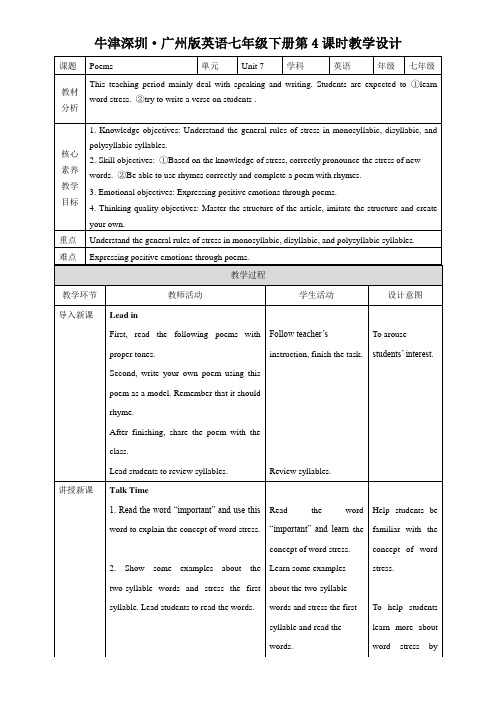
To use what have learnt to writing an article on theirown.
课堂小结
本课学习双音节和多音节词重音的一般规则。同时,通过小组活动朗读一首诗,体会诗歌的意境和作者的情感,同时学会和小组其他成员之间的合作。写作部分要求学生完成一篇描写班级成员的小诗。
3. Show time. Show the poem in class.
Writing
1. A writing game. Introduce the steps to students.
Step 1: Understand the rules of the game.
Step 2: Write your verse about your classmates. Use the example below to help you.
2. Give students some tips to describe their classmates. And give some examples.
3. Analyze the examples and conclude some useful rule to write a verse.
Learn some examples about thetwo-syllable words and stress the second syllable.Read the words.
Learn some examples about thethree-syllable words and stress the first syllable.Read the words.
牛津深圳版英语七年级下册Unit7Poems知识点梳理课件

2.It’s an important meeting. DDono’n’t be (not, be) late for it.
3. HHowow
wonderful the film is!
4. LLooookk (look) out! There are many cars on the road.
(well 好地 adv. well adj. 健康的)
12.shower:washing the body by standing under running water 淋
浴 n.
Unit 7 Poems
13.narrow:small Unit 7 Poems
Unit 7 Poems Unit 7 Poems
from
one
side
to
the
other,
not
wide
狭窄的
adj.
Unit 7 Poems
Unit 7 Poems
(narrowly Unit 7 Poems
Unit 7 Poems
狭窄地,勉强地
adv.)
Unit 7 Poems
Unit 7 Poems
14.height:distance from the base to the top 高度 n. (high 高的
他读书和看报为了知道今天有什么新鲜事。
3.Then I see him working, on the building site. 然后我看到他在建筑工地上工作。
4.He’s walking on a narrow piece of wood, not worried about the height, not afraid, not afraid like me. 他正走在一根狭窄的木头上,不担心高度,不害怕,不像我一 样害怕。
牛津上海八年级下册Unit7 Poems拓展提升练习(有答案)

Unit7 Poems拓展提升练习Ⅰ. Choose the best answer. (单项选择)1. He is the best-selling author in our publishing house. Which of the following is correct for the underlined word?A. /’aːθə(r)/B. /ˈɔːθə(r)/C. /’əːθə(r)/D. /ˈɔːðə(r)/2. Which of the following underlined parts is different in pronunciation with the others?A. It was correct to reject the offer.B. She pretended she was in a foreign country.C. We’d better accept the truth.D. We must be honest about what we did.3. It’s really convenient for us to go sightseeing across the city by______ underground.A. anB. /C. theD. a4. These two fiction books are familiar______ children. But they are different______ the popular book “Harry Potter” in styles.A. to... withB. with... fromC. with ... inD. to.. from5. Many of the songs they wrote were about______ personal life.A. themB. theirC. themselvesD. they6. The scientists made______ possible for people to breathe under the water for a long time.A. thatB. oneC. itD. ones7. He spoke so quickly that I didn’t______ what he said.A. listenB. missC. catchD. receive8. I went to the office to look for our teachers, but I found______ there.A. nobodyB. someoneC. anyoneD. everybody9. It’s impolite to take somebody’s things______ permission.A. withB. withoutC. havingD. getting10. The patient is a bit______ today.A. aliveB. livelyC. livingD. live11. My parents are quite______ with the quality of the goods they’ve bought. They look so happy.A. excitedB. frightenedC. satisfiedD. interested12. The author pretended that the first toy teacher was boring, but______ was kind.A. the othersB. the otherC. the oneD. the other one13. I will do nothing______ he teaches me how to do it.A. thoughB. becauseC. untilD. since14. Because of pollution, not______ is leaving the Earth.A. enough soundB. enough heatC. hot enoughD. cold enough15. Those cards______ many colorful flags dotted around the classroom.A. seemedB. seemed likeC. felt likeD. liked16. Of the three foreigners, one is from New York,______ are from London.A. another twoB. the others twoC. the other twoD. other two17. W: Will you please take this to the manager?M:______ ?W: The sales manager.A. WhatB. WhoC. Which oneD. Whom18. The boy wondered how long______ to fly to Garden City from Shanghai.A. did it take youB. it will take youC. will it take youD. it took you19. - Thank you for helping me with my report.- ______ .A. All rightB. That’s a good ideaC. I’m OKD. My pleasure20. - Would you like one more cup of juice? It seems you’re very thirsty.- ______A. OK. Help yourself.B. Make yourself at home.C. That’s very kind of you.D. I don’t hope so.Ⅰ. Fill in the blanks with the given words in their proper forms. (用所给单词的适当形式填空)1.You become a good______ by writing lots of______ . (poetry)2. I didn’t______ (real) it was so late.3. The______ (nine) month of a year is September.4. The boy is said to be a(n)______ (usual) child because he graduated from university at 12.5. We ought to keep______ (silence) when we are in the library.6. The farmer is______ (fright) of the snake.7. Scientists can hardly give scientific______ (explain) on how trees communicate.8. A______ team was sent to support the rescue team. (medicine)Ⅰ. Rewrite the sentence as required. (按要求改写句子)1.The students on duty have swept the floor already.(改为否定句)The students on duty______ ______ the floor yet.2.This iPad belongs to Stephen.(对画线部分提问)______ ______ this iPad belong to?3.My uncle has a new flat next to our flat.(保持句意基本不变)My ______ new flat is next to______ .4.Could you tell me? Did your sister catch the flu yesterday?(合并为一句)Could you tell me______ your Sister______ the flu yesterday?5. She has told us a very exciting story.(改为感叹句)______ ______ exciting story she has told us!6. The girl did a part-time job. She wanted to support her family.(合并为一句)The girl did a part-time job______ ______ she could support her family.7.whose, was, remember, cant, I, idea, it(连词成句)___________________________________________________________________Reading comprehension(阅读理解)A.Choose the best answer(根据短文内容,选择最恰当的答案)(12分)In the 13th century the famous Italian traveller, Marco Polo, travelled a long way to China. During his stay in China, he saw many wonderful things. One of the things he discovered was paper money. In Western countries, people did not use paper money until the 15th century. However, people in China began to use paper money in the 7th century.A Chinese man called Cai Lun invented paper almost 2, 000 years ago. He made it from wood. He took the wood from trees and made it into paper. He then put these pieces of paper together and made them into a book.Now paper still comes from trees. We use a lot of paper every day. If we keep on wasting somuch paper, there will not be any trees left on the Earth. If there are no trees, there will be no paper. Every day, people throw away about 2,800 tons of paper. It takes 17 trees to make one ton of paper. This means that we are cutting nearly 48,000 trees every day. Since it takes more than 10 years for a tree to grow, we must start using less paper now. If we don’t , we will not have enough time to grow more trees to take the place of those we use for paper.So, can we save paper? We can use both sides of every piece of paper, especially when weare making notes. We can choose drinks in bottles instead of those in paper packets. We can also use cotton handkerchiefs but not paper ones. When wen go shopping, we can use fewer paper bags. If the shop assistant does give us a paper bag, we can save it and reuse it later.Everyone can help to save paper. If we all try our best, we can help protect trees. And we should do it now before it is too late.1.When he was in China, Marco Polo ________.A.discover Cai Lun inventedB. learned to make paper.C. saw many wonderful thingsD. read a lot books2.People in Western countries first used paper money in the ________ century.A.17thB. 15thC. 13thD.7th3.Which of the following is NOT the way of saving paper according the passage?A.to use both sides of every piece of paperB.To use the paper bags from shops more than once.C.To use cotton handkerchiefs instead of paper ones.D.To grow more trees.4.Which of the following is NOT true?A.If we keep on wasting paper, we will have no paper to use.B.The Chinese used paper money much earlier than the westerners.C.About 48,000 trees can be used to make 2,800 tons of paper.D.It is never too late to plant trees for paper.5.Which is the best title of the passage?A.Saving PaperB. The History of PaperB.Cotton Handkerchief Back Again D. Cai Lun, the Great Inventor.B. Choose the best words and complete the passage(选择最恰当的单词完成短文)After supper Mrs Bell hot and came out of the hotel. She got to ____1____ a week before. She liked the city. Now she was walking along a quiet street when she saw a man working in a garden. She stopped to watch him carefully. The old man worked ____2____ and she was sure he was a good gardener.“ I have a garden too.” the woman said to herself. “ I need to go to America with her. “You’ll be able to get rich soon in my country, I think.” said the woman.“Thanks a lot,” said the old man, “ but I’m ____4____ I have another job. I can’t give it up. I’ll have to work for you ____5____ they elect me next time.”“Oh?” the woman said in surprise. “________ are you , then?”“ The President of France.”1.A. Toronto B. Paris C. Moscow D. Sydney2.A. hardly B. sadly C. badly D. carefully3.A. so B. such C. skillful D. special4.A. glad B. afraid C. necessary D. OK5.A. Until B. unless C. because D. as6.A. Who B. How C. What D. WhoseC. Read the passage and fill in the blanks with proper words(在短文的空格内填入适当的词,使其内容通顺。
广州牛津英语七年级下册Unit7 poems 练习

1.诗歌The poet in the Tang Dynasty, Li Bai, was famous for his poems.唐代诗人李白以其诗歌二名垂青史。
【链接】poet 诗人,poetry诗歌(总称)2.普通的,平凡的Now electrical appliances have entered into families. 现在家用电器已经步入普通家庭。
【反义词】extraordinary3.感觉,感情I know your feelings.我理解你的感受。
【动词】feel-- --4.命令(v&n);顺序Soldiers have to obey orders. 军人必须服从命令。
The teacher ordered the students to leave the classroom. 老师要求学生离开教室。
The names are in alphabetical order. 这些名字是按字母顺序排列的。
5.建议give sb. some advice【不可数名词】搭配:a piece of advice;some advice【动词】advise:The doctor advised him to lose weight. 医生建议他减肥。
6.大声地,高声地I read the story to my younger sister. 我给妹妹大声朗读这个故事。
【近义词】loudly7.组,群【搭配】a of +名词复数:一群,一伙8.同意1)with sb/sth同意某人的意见,想法,分析,解释I quite agree with you. 我很赞同你的看法。
We agree with what you say. 我们同意你说的。
2)not agree with sb 对...不适应The food doesn‟t agree with me. 这食物对我不适合。
七年级英语下册Module4ColourfullifeUnit7Poems(第1课时)课件(新版)牛
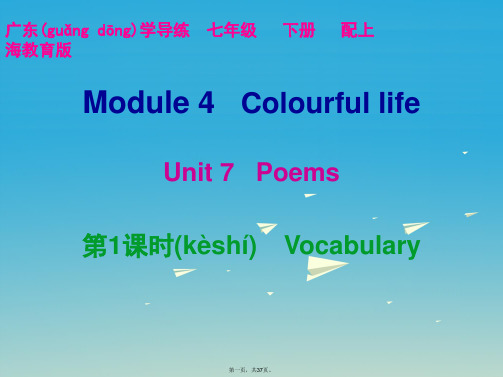
Read the passage aloud, please. 请大声朗读这篇短文(duǎn wén)。 (2)loud 可作形容词或副词。作副词时,强调声音高,一般指谈 笑方面,常与speak, talk, laugh等动词连用,有比较级。作形容词 时,一般用于形容声音、嗓门等大声的、吵闹的。 Speak louder please, or no one can hear you. 请更大声些,否则 没人能听见。 Suddenly there was a loud bang. 突然砰的一声响。 (3)loudly 是副词,与aloud同义,有时可以互换,但往往有令人 讨厌或打扰别人的意思,还可以用来修饰机器声、撞击声等声音。 Suddenly the bell on the wall rang loudly. 突然,墙上的铃大声地 响起来了。
shower 6. 普通(pǔtōng)的;平凡的 (adj.) ________________________
7.
狭窄的
(adj.)
ordinary
________________________
8. 完整的;整个的na(arrdoj.w) ________________________
complete
We are in agreement with their decision. 我们同意他们的决
定。
第十一页,共37页。
(2)disagree v. 不同(bù tónɡ)意 His conduct disagrees with his words. 他言行不一。 (3)disagreement n. 意见不同(bù tónɡ);争论 We have been having some disagreement in the committee lately. 我们委员会中近来发生了一些争执。 【拓展】 (1) agree with sb. 同意某人的意见 I agree with you. 我同意你的意见。 (2) agree on 对……取得一致意见 We agreed on a price for the house. 我们商定了房子的价格。
高教社中职英语基础模块一Unit7 The Internet单元知识清单
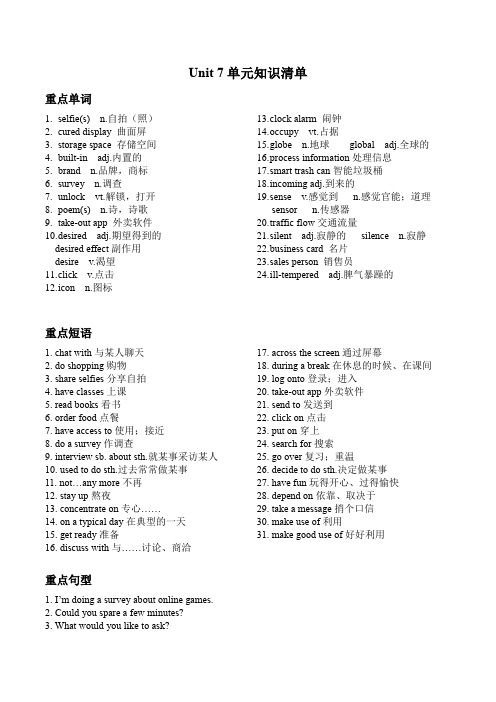
Unit 7单元知识清单重点单词1.selfie(s) n.自拍(照)2.cured display 曲面屏3.storage space 存储空间4.built-in adj.内置的5.brand n.品牌,商标6.survey n.调查7.unlock vt.解锁,打开8.poem(s) n.诗,诗歌9.take-out app 外卖软件10.d esired adj.期望得到的desired effect副作用desire v.渴望11.c lick v.点击12.i con n.图标13.c lock alarm 闹钟14.o ccupy vt.占据15.g lobe n.地球global adj.全球的16.p rocess information处理信息17.s mart trash can智能垃圾桶18.i ncoming adj.到来的19.s ense v.感觉到n.感觉官能;道理sensor n.传感器20.t raffic flow交通流量21.s ilent adj.寂静的silence n.寂静22.b usiness card 名片23.s ales person 销售员24.i ll-tempered adj.脾气暴躁的重点短语1. chat with与某人聊天2. do shopping购物3. share selfies分享自拍4. have classes上课5. read books看书6. order food点餐7. have access to使用;接近8. do a survey作调查9. interview sb. about sth.就某事采访某人10. used to do sth.过去常常做某事11. not…any more不再12. stay up熬夜13. concentrate on专心……14. on a typical day在典型的一天15. get ready准备16. discuss with与……讨论、商洽17. across the screen通过屏幕18. during a break在休息的时候、在课间19. log onto登录;进入20. take-out app外卖软件21. send to发送到22. click on点击23. put on穿上24. search for搜索25. go over复习;重温26. decide to do sth.决定做某事27. have fun玩得开心、过得愉快28. depend on依靠、取决于29. take a message捎个口信30. make use of利用31. make good use of好好利用重点句型1. I’m doing a survey about online games.2. Could you spare a few minutes?3. What would you like to ask?4. How often did you play?5. Why did you like playing games online?6. It was quite popular among young people.7. What made you stop playing those games?8. I often stayed up so late playing games that I couldn’t even concentrate on my studies.9. It’s really wise to quit before it’s too late.10. With smart phones, the Internet becomes mobile.11. At 7:50 am, the phone is ringing for morning hobby classes.12. The teacher is talking about poems.13. While you are putting on your shoes, your mobile phone searches for the nearest shared bicycle.14. We are now building more and more smart cities.15. Life is becoming more and more convenient in China.翻译:1、我正在做一个关于网络游戏的调研。
unit+7+imperatives教案新部编本
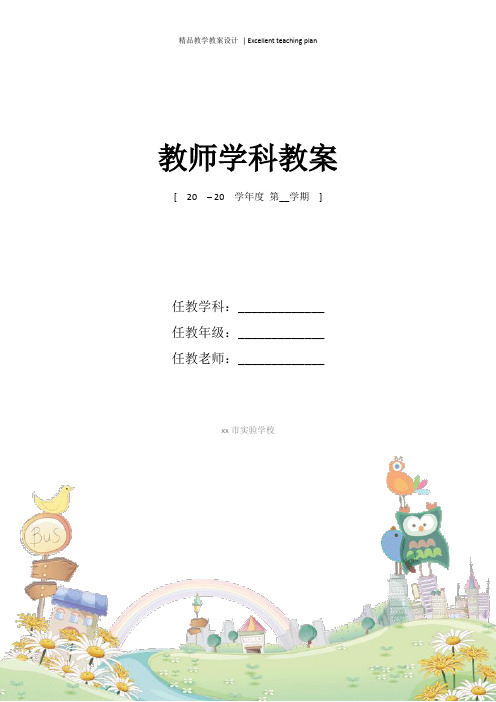
教师学科教案[ 20 – 20 学年度第__学期]任教学科:_____________任教年级:_____________任教老师:_____________xx市实验学校Unit 7 PoemsLesson 3 Imperatives董封中学杨婷婷Learning aims:1.Review some phrases2.Learn to use the imperatives to give orders or advice.3.Express your advice or demand properly.Learning points: aim1, aim 2.Learning procedures:Step 1. Lead in. Listen to the orders, follow them.(师强调:要认真听每一条指令)。
1.Stand up.2. Listen carefully.3. Turn right.4. Turn left.5. Sit down ,please.Choose some students: 6. Open the door. 7. Close the door.8. Switch on the fan. 9. Switch off it.Step 2. Group work. Work in groups of four, what orders did I say just now? Write them down.(提醒学生一共九条指令)抽生板演,check the answers.Read them together.总结:they are imperatives.Positive imperatives 结构:动词原形+其他。
Step 3.听写句子:1. 不要开窗户。
(Don’t open the windows.)2.不要在教室里跑。
(Don’t run in the classroom.)师:They are negative imperatives.总结:negative imperatives 结构:Don’t +动词原形+其他。
牛津Unit 7 Poems
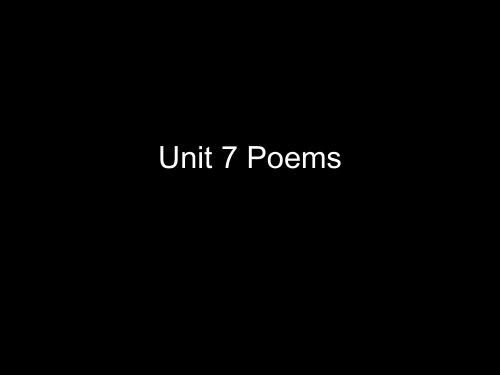
• group: 普通用词,通常指有组织、有秩序 的一群人,也可指无意汇集在一起的一群 人。 • crowd: 常指无组织地乱哄哄地挤在一起的 人群。
4.order
n. 命令;秩序;规则,制度;次序 vt. 命令;订购;整理 vi. 下订单 • I don't take orders from him any more... 我不再 听他差遣。 • He ordered the women out of the car... • 他命令这些女人下车。 • The waitress appeared. 'Are you ready to order?'... 女侍者走上前来,“您准备好点餐了 吗?”
rush out
4.smile
n. 微笑,笑容 vt. 以微笑表示;以微笑完成 vi. 微笑;赞许;不在乎 • 1. He quickly donned a welcoming smile as his guests arrived. 客人一到,他立刻笑脸相迎。 • 2. He has a forbearing nature; he accepts trouble with a smile. 他天生容忍,遇到麻烦都能一笑了事。 • 3. His jokes didn't even raise a smile, which was embarrassing. 听了他讲的笑话,都没人笑一下,真是太 尴尬了。 • 4. The ghost of a smile played round her lips. 她嘴角露出 一丝微笑。
Ph.
a crowd of (not) at all newspaper stand rush out (be)worried about 一群 一点也(不),完全(不) 报摊 冲出去 担忧,担心
英语七下-Unit7教案(语法)
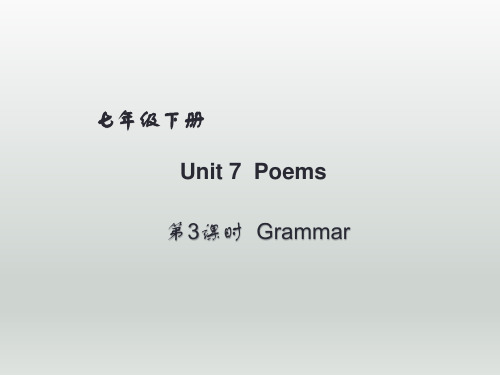
Don’t play with fire. 不要玩火。(表命令) Don’t be nervous when you have an interview. 你在面试时不要紧张。(表建议)
2. 以let开头的祈使句,后面加动词原形和 宾语;否定形式是在动词前面加not。如:
Let’s protect our Earth together! 让我们一起保护地球吧!
But it feels nice to be loved like that. Who else would care enough to keep all of my terrible _5_._d_r_a_w_i_n_g_s___ (draw) and silly poems? Only a mother. On Mother’s Day when I was little,I _6_.__u_s_e_d_________(use) to bring my mum breakfast in bed, make her a card, give her kisses and tell her I loved her. I would say to her:“You’re the _7_._b_e_s_t____ mum in the whole world!”
七年级下册 Unit 7 Poems
第3课时 Grammar
祈使句 1. 祈使句表示请求、命令、建议、劝告和号召 等含义,其肯定形式是以动词原形开头,否定形 式是在动词原形之前加 don’t。如: Please give me another chance. I will do it better. 请再给我一次机会吧。我会做得更 好的。(表请求)
三、选择填空 ( A )1. —I’m tired out after threeday work day and night. —_____ relax yourself? Go out and enjoy the natural beauty. (2019扬州) A. Why not B. Why don’t C. What about D. Shall we
牛津上海八下 8B Unit7 Poems 知识点梳理

8B Unit 7 PoemsP1091. recite v. 背诵—recitation n. 背诵;朗诵2. poem n.诗歌---two poems—poet n.诗人one of the most famous poets 最著名的诗歌之一3. All right. =OK 好吧That’s all right. 没关系。
You’re right. 你是对的;你说得对。
That’s right. 那是对的。
4. sometimes 有时;时而=from time to time =at times =now and then5. some times 几次e.g. I have been to Garden City some times. 我去过花园城几次。
6. sometime 某个时候 e.g. sometime next week 下个礼拜的某一个时候sometime last month 上个月的某个时候sometime this year 今年的某个时候7. some time 一段时间经常用在for,after后e.g.I stayed there for some time. 我在那里待了一段时间。
After some time, the baby stopped crying. 过了些时候,那个婴儿不哭了。
8. wonder v./ n.想知道;奇迹—wonderful a.精彩的;美妙的—wonderfully adv.wonder v. =want to know seven wonders of the world 世界七大奇迹9. call me Hi 叫我Hi;把我叫做Hi He is called Hi. 他被叫做Hi.A man called John called you just now. 一个名叫约翰的人刚才打电话给你了。
10. He would like to know. =He wants to know. 他想知道。
unit7poems语法练习和词汇精讲
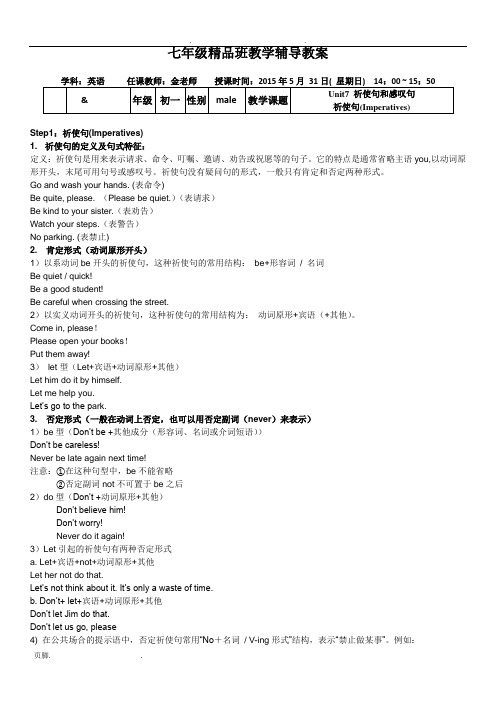
七年级精品班教学辅导教案Step1:祈使句(Imperatives)1. 祈使句的定义及句式特征:定义:祈使句是用来表示请求、命令、叮嘱、邀请、劝告或祝愿等的句子。
它的特点是通常省略主语you,以动词原形开头,末尾可用句号或感叹号。
祈使句没有疑问句的形式,一般只有肯定和否定两种形式。
Go and wash your hands. (表命令)Be quite, please. (Please be quiet.)(表请求)Be kind to your sister.(表劝告)Watch your steps.(表警告)No parking. (表禁止)2. 肯定形式(动词原形开头)1)以系动词be开头的祈使句,这种祈使句的常用结构:be+形容词/ 名词Be quiet / quick!Be a good student!Be careful when crossing the street.2)以实义动词开头的祈使句,这种祈使句的常用结构为:动词原形+宾语(+其他)。
Come in, please!Please open your books!Put them away!3)let型(Let+宾语+动词原形+其他)Let him do it by himself.Let me help you.Let’s go to the p ark.3. 否定形式(一般在动词上否定,也可以用否定副词(never)来表示)1)be型(Don’t be +其他成分(形容词、名词或介词短语))Don’t be careless!Never be late again next time!注意:①在这种句型中,be不能省略②否定副词not不可置于be之后2)do型(Don’t +动词原形+其他)Don’t believe him!Don’t worry!Never do it again!3)Let引起的祈使句有两种否定形式a. Let+宾语+not+动词原形+其他Let her not do that.Let’s not think about it. It’s only a waste of time.b. Don’t+ let+宾语+动词原形+其他Don’t let Jim do that.Don’t let us go, please4) 在公共场合的提示语中,否定祈使句常用“No+名词/ V-ing形式”结构,表示“禁止做某事”。
Unit7PoemsVocabulary词汇讲解课件共23张PPT
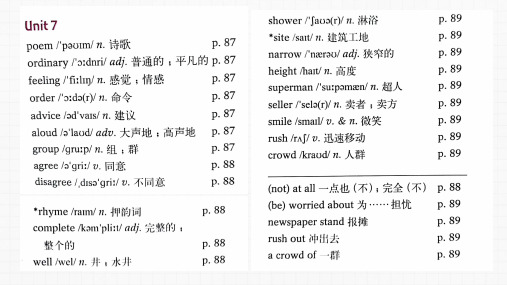
aloud
/ə'laʊd/
adv. 大声地,高声地 = loudly
loud adj. 大声的,吵闹的
1. 请大声朗读这首诗。
Please _r_e_a__d_ _a__lo__u_d__ this poem.
2. 音乐太吵了,请把它调低点。
The music __i_s__ _t_o_o_ _l_o_u__d_. Please turn it down.
advise /əd'vaɪz/ v. 建议 advise sb (not) to do sth
建议某人(不要)做某事
a piece of advice 一个建议
advise /əd‘vaɪz/ v. 建议
advice on/about sth 关于…的建议 advise sb (not) to do sth
/haɪt/
the height of … …的高度
1. 广州塔的高度是多少?
What ___is___ _t_h_e__ h__e_i_g_h__t __o_f__ the Canton Tower.
形容词(adj.) high 高的 long 长的 wide 宽的 deep 深的
名词(n.) height 高度 length 长度 width 宽度 depth 深度
2. 不用担心天气,明天会是晴天。
Don’t _w__o_r_r_y_ __a_b_o__u_t_ the weather. Tomorrow will be a sunny day.
Thank you
v.
make sb/sth + adj.
but I _c_o__m__p_l_e_t_e_l_y_ have no idea what to do.
沪教牛津版牛津版七年级下册英语知识点总结Unit7Poems

沪教牛津版牛津版七年级下册英语知识点总结Unit7 Poems重点短语:1. (not) at all 一点也(不),完全(不)2. (be ) worried about 为……担忧3. newspaper stand 报摊4. rush out 冲出去5. a crowd of 一群6. with tired face 带着倦容7. hurry to work 匆忙去工作8. change one’s idea (about sth) 改变(对某事的)看法9. give sb advice 给某人建议10.take sb’s advice 接受某人建议11.find out 找出,查明12.high up in the cloud 高入云层13.a piece of wood 一块木头14.all the time 一直15.in class 在课堂上16.on a windy day 在一个刮风的一天17.in a low voice 用低沉的声音18.leave the door open 让门开着19.on my way 在我的路上20 come up 接近,发生21.follow the rules 遵守规则22.clean up 打扫23.knock on the door 敲门24.from dawn to dusk 从黎明到黄昏,从早到晚25.keep out city green 保持我们的城市绿色26.look like 看起来像27.think of. 认为,想起Getting ready1. Read two poems about ordinary people. 读两首关于普通人的诗歌. ordinary 普通的;平凡的out of the ordinary 不平常;非凡2. Listen to four short poems about feelings. 听关于情感的短诗.(1)feel 连系动词意为”感到,感觉”I feel very tired today. 我今天感到非常累.(2)feel及物动词,意为”感觉,触摸”.I felt the house shake yesterday. 昨天我感到非常累.3. Learn how to use imperatives to give orders or advice. 学会如何使用祈使句给出命令或建议.(1) order 这里用作名词,意为”命令” 也可以是动词”命令”This is an order. 这是命令.The police ordered them to wait right there. 警察命令他们就在那儿等候.(2) order 及物动词, 意为”订购,点菜”I want to order a ticket. 我想订一张票.(3) advice 不可数名词,意为”劝告,建议”. a piece of advice 一条建议The teacher often gives advice to his students. 这个老师经常给他的学生提建议.4. Read a poem aloud in a group. 在小组里大声读诗.aloud 副词,意为”出声地; 高声地”.Please read the text aloud. 请朗读一下课文.----Miss Li, could you give me ______ on English learning?----Certainly. First you should speak English every day.A.any advicesB. many advicesC. some adviceReading1. agree to 同意……(意见),to后多接表示计划、建议、安排、决定等的名词或代词。
Unit7Poems
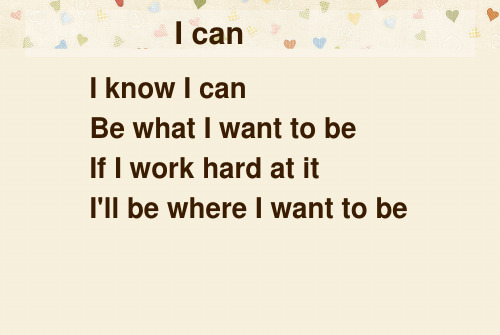
2. How many verses are there in this poem? There are six verses.
3. How many lines are there in each verse? There are four lines.
It’s the noisiest house In the whole of our town, There’s doors always slamming And things falling down.
There’s my dad, who keeps shouting, And my mum, who breaks things, The baby (who’ll bite you!) And our dog running rings.
the others do.
It’s the noisiest house In the whole of our town, There’s doors always slamming And things falling down.
There’s my dad, who keeps shouting, And my mum, who breaks things, The baby (who’ll bite you!) And our dog running rings.
There’s my sister the screamer And my brother who roars, And a grandpa who’s stone deaf (He’s the one who slams doors).
七年级英语 Unit7 Poems 区分what和how的感叹句教学设计1
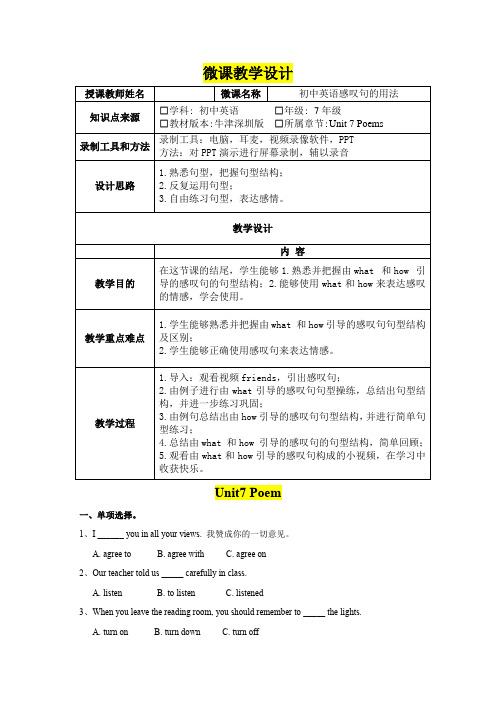
3、What is the high of that wall?
答案:
1、Learn how to use imperatives to give orders or advice.
2、All poems use complete sentences.
3、What is the height of that wall?
微课教学设计
授课教师姓名
微课名称
初中英语感叹句的用法
知识点来源
□学科:初中英语□年级:7年级
□教材版本:牛津深圳版□所属章节:Unit 7 Poems
录制工具和方法
录制工具:电脑,耳麦,视频录像软件,PPT
方法:对PPT演示进行屏幕录制,辅以录音
设计思路
1.熟悉句型,把握句型结构;
2.反复运用句型;
3.自由练习句型,表达感情。
教学设计Biblioteka 内容教学目的在这节课的结尾,学生能够1.熟悉并把握由what 和how 引导的感叹句的句型结构;2.能够使用what和how来表达感叹的情感,学会使用。
教学重点难点
1.学生能够熟悉并把握由what 和how引导的感叹句句型结构及区别;
2.学生能够正确使用感叹句来表达情感。
2、She is so______about the film.(exciting)
3、Listen to four short poems about______.(feel)
答案:
1、standing2、excited3、feelings
三、修改句子。
1、Learn how to use imperatives to give orders or advices.
初中七年级英语教案Helping hands-说课一等奖
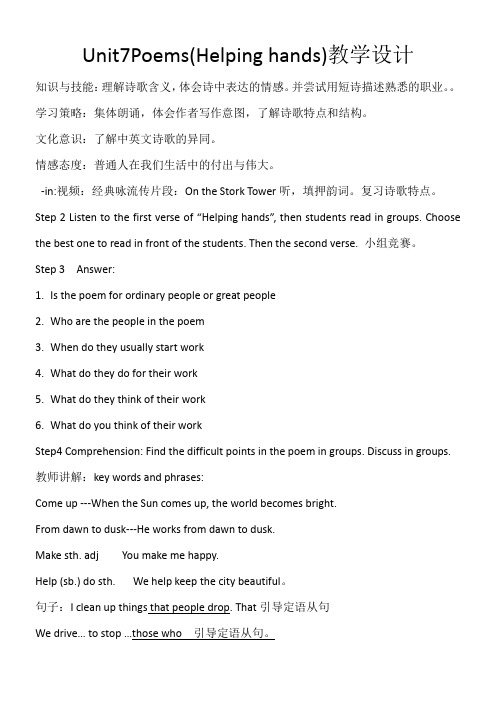
Unit7Poems(Helping hands)教学设计知识与技能:理解诗歌含义,体会诗中表达的情感。
并尝试用短诗描述熟悉的职业。
学习策略:集体朗诵,体会作者写作意图,了解诗歌特点和结构。
文化意识:了解中英文诗歌的异同。
情感态度:普通人在我们生活中的付出与伟大。
-in:视频:经典咏流传片段:On the Stork Tower听,填押韵词。
复习诗歌特点。
Step 2 Listen to the first verse of “Helping hands”, then students read in groups. Choose the best one to read in front of the students. Then the second verse. 小组竞赛。
Step 3 Answer:1.Is the poem for ordinary people or great people2.Who are the people in the poem3.When do they usually start work4.What do they do for their work5.What do they think of their work6.What do you think of their workStep4 Comprehension: Find the difficult points in the poem in groups. Discuss in groups.教师讲解:key words and phrases:Come up ---When the Sun comes up, the world becomes bright.From dawn to dusk---He works from dawn to dusk.Make sth. adj You make me happy.Help (sb.) do sth. We help keep the city beautiful。
- 1、下载文档前请自行甄别文档内容的完整性,平台不提供额外的编辑、内容补充、找答案等附加服务。
- 2、"仅部分预览"的文档,不可在线预览部分如存在完整性等问题,可反馈申请退款(可完整预览的文档不适用该条件!)。
- 3、如文档侵犯您的权益,请联系客服反馈,我们会尽快为您处理(人工客服工作时间:9:00-18:30)。
The Plan of the Students(学案)
Unit 7.Poems (Vocabulary)
T: Miss Zhang Ss:Class 5&6,Grade7 June 3rd
一.学习目标:
1. You can read the new words.
2. You can spell the new words and how to use them.
3. You can kown about the languages of the news words
二.学习重难点
1. You can spell the new words and how to use them.
2. You can kown about the language points of the new words.
三.学习方法:Competition(PK), cooperation(团结合作), self-study(自学成才). 四.学习过程:
Step1.Self-study(自学)
Study the new words in groups with the guide of your team leaders.
petition (眼疾口快)
Rules:
1.看到会读的单词,直接站起来并大声读!
2.优先抢到,发音正确并声音洪亮者升一级。
Step3.Read the words and expressions loudly.
poem n. 诗歌
ordinary adj. 普通的;平凡的feeling n. 感觉;情感order n. 命令
advice n. 建议
aloud adv. 大声地;高声地group n. 组;群complete adj. 完整的;整个的well n. 井;水井shower n. 淋浴
*site n. 建筑工地narrow adj. 狭窄的
height n. 高度
superman n. 超人seller n. 卖者;卖方smile v.﹠n. 微笑
rush v. 迅速移动
rush out 冲出去
agree v. 同意
disagree v. 不同意
rhyme n. 押韵词
crowd n. 人群
a crowd of 一群
(not) at all 一点也(不);完全(不) (be) worried about 为…… 担忧newspaper stand 报摊
Step 4. Game time.
You can choose a card.You can discuss in your group in 10 seconds, then answer.If you are correct, you may get the points But if you get a typhoon, it will blow away the points.(你可以选择一张卡片,你可以在小组里面讨论十分钟,如果你答对了,你讲获得相应的分数,如果你选中的是台风,那么你将没有分数)
Step 5.Learn the language points :(Take notes做笔记)
1.feeling 感觉情感(复数) _________
2.Fall(过去式) __________
3.advice n. 建议(动词)______________
4.区分:loud _____________________
loudly______________________
aloud_______________________
5.agree(反义词)___________
plete :(同义词)____________
8.narrow 窄的(反义词)___________
9.height n. 高度(形容词)______________
10.be worried about 为…担心(同义词)____________
Step6.Exercise.
1. This book is about o _________ people like you and me.
2. I don’t know why he never t akes my a _____.
3. She always becomes angry when people d_________ with her.
4. Do you prefer to take a bath or a s________?
5. There are a lot of long and n_________ roads in this town.
6. You don’t need to r_________. We have plenty of time.
Step7.Homework.
1.Recite the words and expressions
2.Finish the exercise P97-98。
